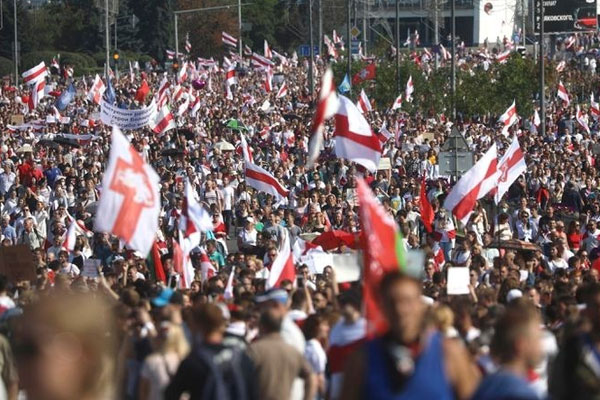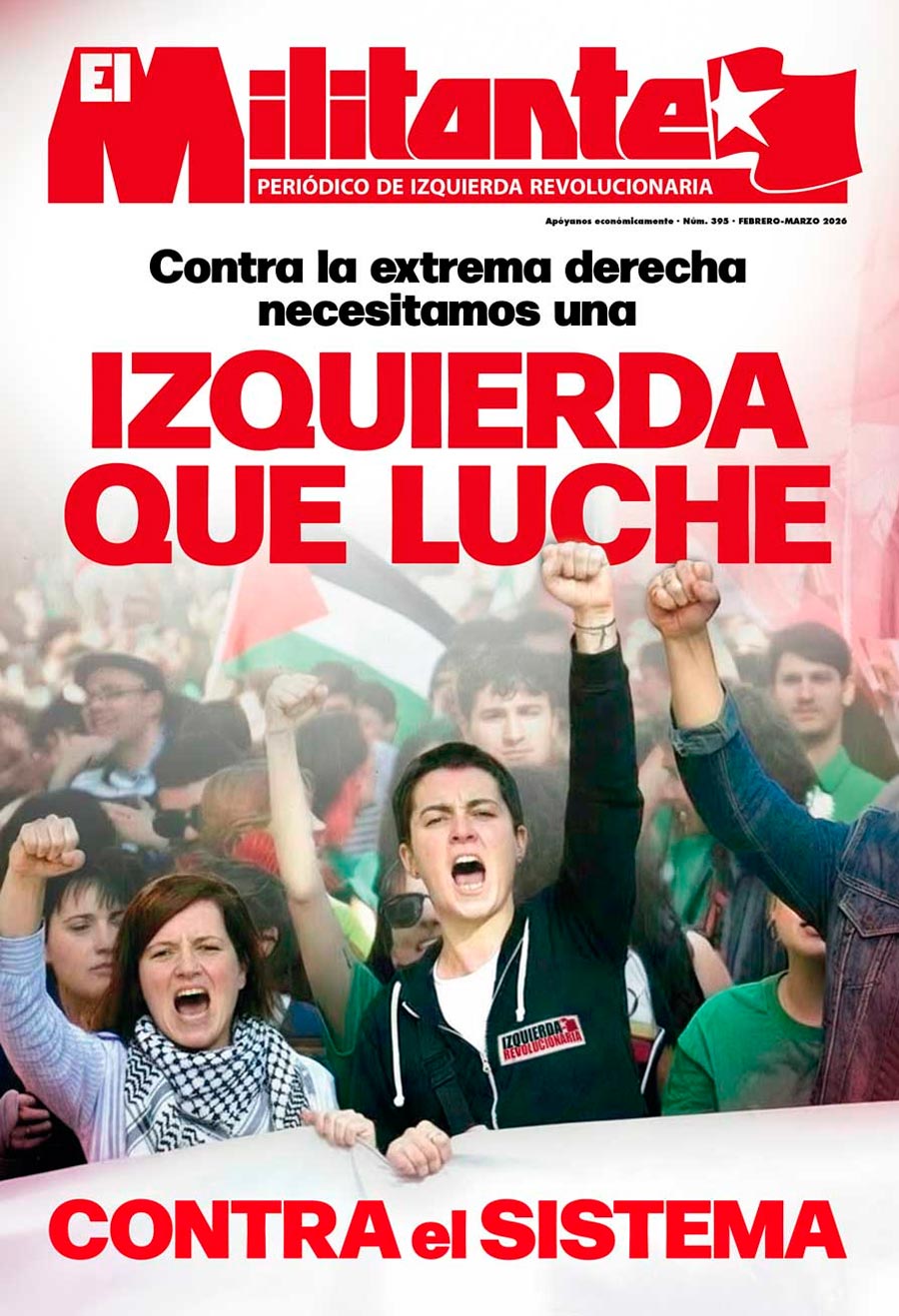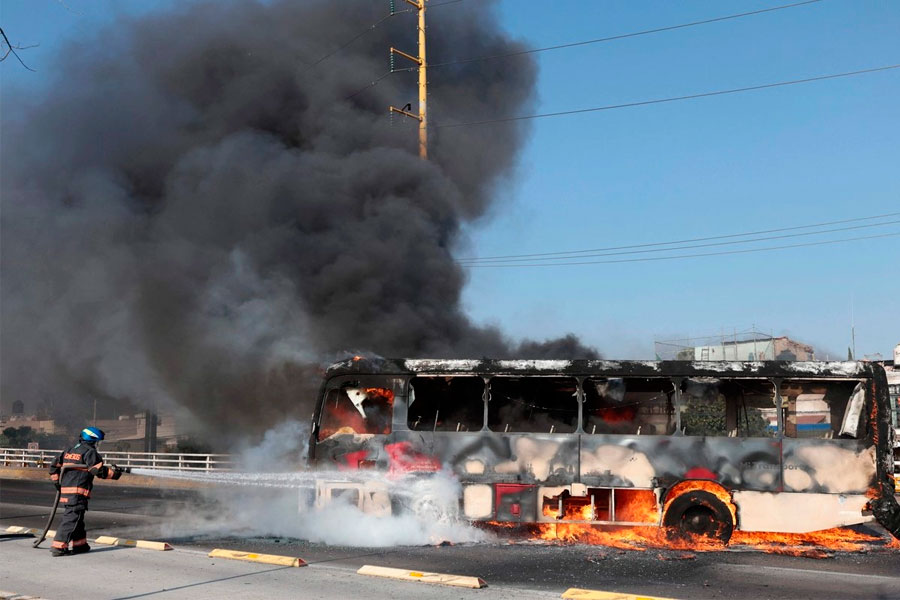No confidence in the pro-imperialist liberal opposition!
The struggle of the working class with a socialist programme is the only way!
The social uprising that took place in Belarus on August 9 has put the Bonapartist and bourgeois regime of Alexander Lukashenko on the ropes. The precipitator of the crisis was the blatant electoral fraud, which gave the current president over 80 percent of the votes compared to a mere 10 percent for the opposition candidate. Since then, the leading clique has deployed an intense repression that has caused several deaths, indiscriminate torture and more than 7000 arrested, but has shown itself powerless to stop the hundreds of thousands of people -at the beginning mostly young, but with a quick incorporation of the labourers- who continue to fill the streets of the capital Minsk and dozens of cities of the country.
Who is Lukashenko and what does the pro-imperialist opposition offer?
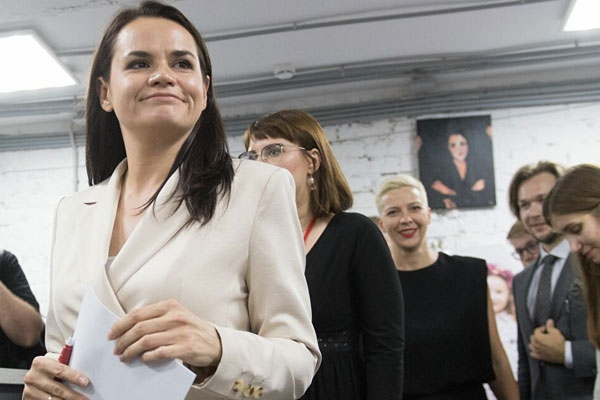
An intense campaign has been launched from the Western media to denounce Lukashenko as a dictator who only uses force to crush his people. But the images from Minsk are not much different from those we see in many US cities, where the National Guard and police are conducting daily repressive operations against Blacks Live Maters protesters on Trump's orders.
Therefore, the first thing we must be clear about is the enormous hypocrisy of the Western capitalist powers, and their interest in gaining a decisive influence in Belarus, just as they did in Ukraine. But the strong denunciation of the imperialist manoeuvres does not mean that we have to defend Lukashenko's despotic regime. Although his secret police is still called KGB, he does not lead any deformed workers' state, but a country where the Belarusian bourgeoisie born from the bowels of the former Stalinist bureaucracy has taken control of the state structures and has enriched itself by decades. Like Putin, Lukashenko is no "communist", but a ruffian who embodies all the most deplorable features of grand Russian nationalism and its crony capitalism.
Opposing candidates, who are staunch defenders of the market economy and agents of the imperialist powers, but who have shared a table and a tablecloth with Lukashenko for a long time when plundering and exploiting the Belarusian people, are standing in front of this character. The favourite in all election polls was the banker Viktor Babariko. The other two are Valeri Tsepkalo, former ambassador to the USA and advocate of a radical neo-liberal privatisation agenda, and the liberal blogger Sergei Tijanovskiy, owner of several night clubs. All of them were finally imprisoned by Lukashenko and prevented from running for office. But they are the ones behind the candidacy led by Svetlana Tikanovskaya.
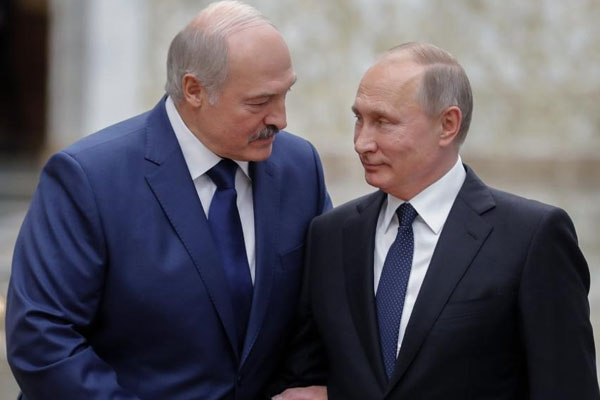
The central slogan of Tikanovskaya's campaign was "we are 97%", attempting to highlight Lukashenko's isolation, which was further increased not only by the social crisis and repressive measures but also by his lunatic and denialist position regarding the coronavirus pandemic. Like other "experts" in his field, the president advised drinking vodka as a preventive measure, which has not prevented the number of people infected from rising above 70,000 in a population of 9.4 million.
Wave of strikes. The working class puts its stamp on events
After several days of protests, a turning point occurred on 13 August. Thousands of factory workers across the country went on strike and took part in large demonstrations. The strike movement began in Minsk at the country's main car plant, BelAZ. Hundreds of companies from both the state and the private sector joined the strike. Factories in the fields of metallurgy, electronics, information technology, pharmaceuticals, ceramics, fertilizers, automobiles, construction, oil, textiles, cement, chemicals, food processing, telecommunications, and mining. This wave culminated on 17 August with a total strike and industrial production virtually halted.
Lukashenko's attempts to take a bath of masses and popular support, and to strengthen the official discourse that the protests are the result of "foreign interference" to destabilize the country, failed completely. During a visit to the state Minsk Truck Factory, which he had expressly chosen, he was booed by the workers called there. This is a reflection of the weakness of the Belarusian president, which can also be seen in the actions organised in favour of the regime, which are very much in the minority.
The industrial sector has been joined by health workers, teachers, musicians and public television, among others. The mass participation of the working class is unprecedented since the Belarusian separation from the former USSR. And this is a very important element in the situation.
To tackle the situation, Lukashenko has resorted to his peculiar version of the stick and carrot. On the one hand, he has intensified the repression to try to stop the protests. He has deployed the army in the western part of the country where the most important industries are located and has also taken the tanks out on the streets. And on the other hand, he is offering "dialogue" to the opposition, inviting it to "adopt a new constitution (...) ratify it in a referendum, and then, with the new constitution, if you wish, have parliamentary, presidential and municipal elections" (these were his words in his speech at the Minsk factory). This is the old manoeuvre of a regime on the edge of the abyss that is trying to gain time and divert the workers' anger into the safe channels of parliamentarianism and negotiation with a clique it knows very well.
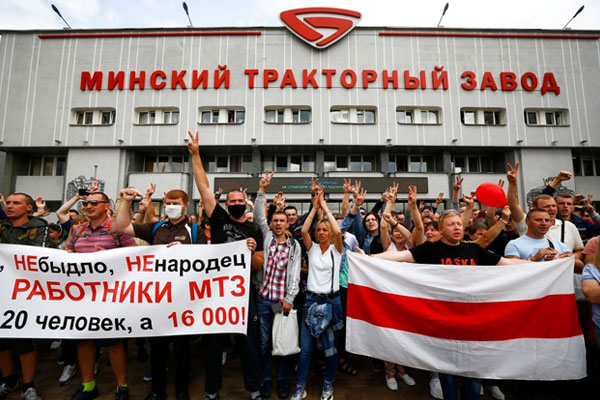
The difficulties of making the voice of the class-based left heard in this conflict are obvious. For years, Lukashenko has charged hard against the revolutionary left and tightly controlled the trade unions, applying to the letter what he learned under the Stalinist period. But this does not mean that sections of the working class are not drawing important conclusions from their own experience. At the beginning, the demands of the workers were limited to demand Lukashenko's resignation and the repetition of the elections. However, as the protests have increased, they have added demands with a class and revolutionary bias. One example is the pamphlet published by the country's largest strike committee which among other demands calls for the creation of independent trade unions, a ban on the privatisation of industrial and agricultural enterprises, the repeal of pension reform, the simplification of the process of revoking deputies and civil servants, and the creation of workers' councils and workers' self-management in factories.
These demands clash not only with the capitalist regime of Lukashenko, but also with the claims of the bourgeois opposition and Western imperialism. For the European Union, the objective is not the defence of democracy but the profits that its banks and multinationals can achieve with the privatisation of the Belarusian public enterprises, and the control of a strategic country against Putin's Russia.
What is at stake
Until relatively recently, Belarus was one of the most stable countries in the region. Lukashenko came to power in 1994, and if he has remained in power for so many years after the capitalist restoration process, it is because he managed to ensure that privatisation and the economic transition to capitalism took place while retaining a significant public sector, especially heavy industry, on which he could rely. This was combined with the creation of free economic zones where hundreds of foreign companies were guaranteed not to pay taxes and could exploit a skilled labour force for very low wages.
The economic stability allowed the regime to maintain a remarkable degree of protection in health and education, employment and social infrastructure. These are the conditions that have earned it significant popular support, especially in the agricultural areas that also weigh heavily on the Belarusian economy. Lukashenko wasted no time in these years and is estimated to have amassed a personal fortune of $9 billion.
Peace of mind ended in 2011 with the arrival of the economic crisis: inflation got out of control, unemployment increased significantly, and privatizations increased as did cutbacks and counter-reforms in exchange for IMF loans: raising the retirement age, elimination of social benefits... Today the average wage is 420 euros, one of the lowest in Europe. According to official data, since the beginning of the crisis, 8% of the population has left for Russia or the EU in search of employment. Although the official poverty rate is 5%, it is estimated that actually about 20% of the population is poor.
In this way, the bourgeois Bonapartist regime of Lukashenko has been losing social support, encouraging and intensifying the disputes between different sectors of the ruling class and the state apparatus, and giving wings to those who bet on executing wild privatization plans, liquidating the state economy and aligning themselves with the Western imperialism in order to get away from the Russian influence.
Russian imperialism is not an ally of the Belarusian working class
The other factor that made Belarusian stability possible and has now turned into its opposite is Russia's extreme economic dependence. In the past period relations between Moscow and Minsk have been very tense, to the extent that a few days before the elections the Belarusian police arrested 33 Russian mercenaries whom Lukashenko accused of preparing terrorist acts to destabilise the country.
Since 1997 the two countries have formed a political and economic union, and Belarus has benefited from access to a market of almost 150 million people. The most important aspect of this agreement was that Russia sold gas and oil at cost price which were then resold by the Belarusian government on the international market, providing it with huge profits every year.
Relations progressively deteriorated from 2014 onwards, when Lukashenko distanced himself from Putin by defending Ukraine's territorial integrity and not recognising the annexation of the Crimean peninsula to the Russian Federation. This decision was logically interpreted as a step towards rapprochement with the EU, which furthermore lifted the economic sanctions imposed on Lukashenko's regime.
Another milestone in the tensions with Russia occurred in autumn 2019, when the Belarusian government refused to integrate into the Russian Federation. In retaliation, Russia cut economic aid until it withdrew oil subsidies in February this year. It was precisely the removal of this aid and the fall in the price of crude oil that was the final straw for the Belarusian economy.
Of course, Putin's concern about the ongoing rebellion has nothing to do with the welfare of the Belarusian people. As it happened in Ukraine, Belarus is for Moscow another pawn in its struggle with Western imperialism for control and influence in the region. The loss of Ukraine has been a hard blow for Putin, who is not going to tolerate a new withdrawal in a territory that he actually still considers as part of Russia. Putin-who had adopted a low profile in the first days of protests, even calling for the release of political prisoners although recognising the election results-is increasingly swinging to shore up the regime of Lukashenko, who appears determined not to relinquish power easily.
Following a telephone conversation between the two presidents on 30 August, they have agreed to meet in the "near future". Mr Putin has also pledged financial support to Belarus and has responded favourably to the request to set up "a reserve security unit" to intervene in Belarus "if the situation gets out of hand". The possibility of a Russian military intervention cannot be ruled out, but the consequences of such an act are unpredictable and could bring more difficulties than advantages to Putin. The capitalist government in Moscow has been navigating through very turbulent waters for years, and this could lead to mobilisations against it within its own borders.
For a policy of class independence, for socialism
In this context, the massive and determined participation of the working class worries all sectors of the Belarusian ruling class, but also the Kremlin, the EU, NATO and the US imperialism.
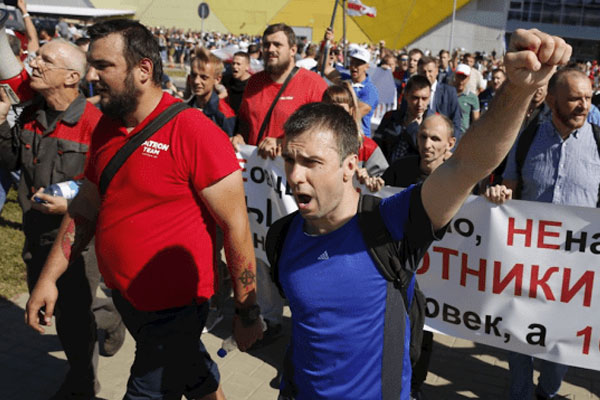
The strike movement arose from the workers' own initiative, who have put their stamp on the events by giving them a very different character from that of Ukrainian Maidan, in which petty-bourgeois elements predominated at the beginning and openly fascist ones at the end.
It is very significant that opposition leaders called on workers to "restrain" and return to their jobs. Seeing that their words were falling on deaf ears, they resorted to creating a Coordination Committee for the transfer of power, with just over thirty members, and whose composition is mostly made up of company executives.
At the same time, numerous factory committees and assemblies are springing up that are driving the strikes from below and with a decentralised character. The electronic publication Bieloruski Partisan points out that "many factories are boiling over, they are brandishing their demands, they are creating strike committees".
It is a crucial moment for the Belarusian working class, it is an opportunity to free itself not only from Lukashenko and his clique, but also from the oligarchs who have enriched themselves by plundering the Belarusian state.
Unfortunately, the Belarusian Communist Party (PCB) is a mere appendage of the regime, while A Just World, formed from a split in the PCB and which has many young people in its ranks, limits itself to defending "honest elections, a people's court and freedom for all political prisoners". It is imbued with reformist illusions and subordinates itself to the bourgeois "democratic" opposition.
The Belarusian working class is showing its strength and capacity of resistance and offensive. It cannot trust Lukashenko, nor Putin, but neither can it trust the pro-Belarusian opposition that only wants to hand over the country to European or American imperialism for its later plunder. It must equip itself with a programme of class independence that defends the renationalisation of the privatised sectors under the control of the workers and the end of corruption in the state corporations. It must reject the policies of austerity and privatisation, cancel the increase in the retirement age, defend quality public education and health, and the restoration of all the benefits and social allowances lost with capitalist restoration.
Together with these demands, the labouring vanguard must strongly oppose the imperialist intervention of the West or Russia, fight for the freedom of organisation and demonstration and all political prisoners. And most important, it has to create its own fighting bodies and independent trade unions, as a part of a process of building a revolutionary party that will raise the flag of socialist transformation of Belarus.






